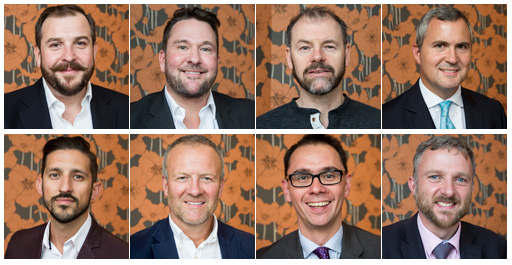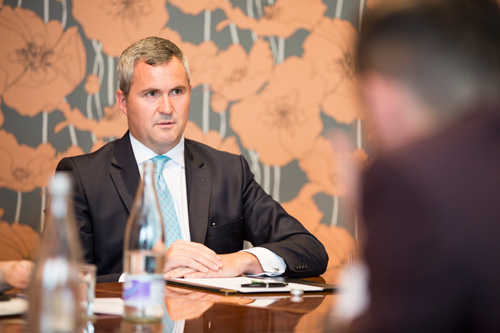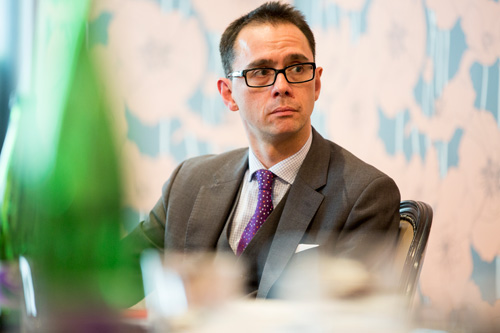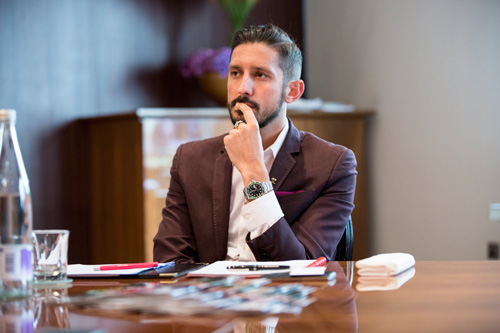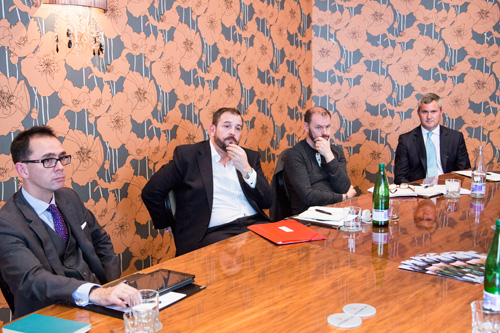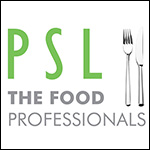Roundtable: Can hotels keep up with the restaurant boom?
The UK's dining scene has changed almost beyond recognition, but where does that leave hotel food and beverage? *The Caterer*Tom Vaughan reports
The panel
Simon Burdess, vice-president food and beverages, InterContinental Hotels Group
Riddian Davies, general manager, the Cumberland
Chris Galvin, chef-patron, Galvin restaurants
Stuart Geddes, hotel manager, the Goring
Jordan Kiziuk, F&B operations development manager, PPHE Hotels
Des McDonald, restaurateur
Simon Numphud, director of sales, PSL
Daniel Wilson, managing director, PSL
Top row L to R: Simon Burdess, Riddian Davies, Chris Galvin, Stuart Geddes
Bottom row L to R: Jordan Kiziuk, Des McDonald, Simon Numphud, Daniel Wilson
How has hotel dining changed over the past 20 years?
Jordan Kiziuk (JK): In the time I have been in the industry - about 15 years - our company's attitude to it has changed massively. It used to be seen as a necessary evil - hotels had to provide an offering to guests just because they needed feeding. With our company, we now want to create destination spaces to keep guests on-site.
Simon Burdess (SB): It sharpens our own proposition - we are in the business of opening hotels and, if restaurants help us do that, it makes us more competitive in the market. Most importantly, our surveys show that the touch points where you give service are critical to building loyalty, and we see that more in the restaurant space than in any other point in the guest's journey.
What do modern travellers want from a hotel restaurant?
SB: There are many different types of traveller, but I think more and more they want an authentic experience. People are getting savvier to the idea that they can walk out of a hotel and get great food at a decent price. Hotels are having to wake up to the fact that if they want them to stay in, they can't continue to do mediocre food at high prices.
Simon Numphud (SN): It's the flexibility of choice that has changed the most. Consumers are less constrained by just what the hotel is offering - they want something that appeals to them and they want it available in their own time, so they will often go out and get it.
Riddian Davies (RD): The pop-up and street food scene has become such an integral part of London's atmosphere. The availability of food outside your door is now incredible and I think all hotels can suffer because of that if they can't keep up with that dynamic change.
JK: For me, what is important is that travellers want the restaurant's brand voice to be different from the hotel. The tone of voice coming from our restaurant has to be different from Park Plaza, which can be quite business-like and corporate.
Daniel Wilson (DW): I think we need to separate this from London. If you are in the middle of nowhere and the hotel is the only option the guest has got, you are feeding them by default, but you need to look after those people.
Historically, this captive audience has been taken for granted, but sleeper diner numbers continue to slide, even in the provinces. Hotels need to think about it differently and not stick to the same fixed-priced menus. Guests want choice and flexibility - they want a more sophisticated approach.
Chris Galvin (CG): We've always got so much to learn from airports. I've just come back from Florence and there is a tiny bar there where you can get fresh pasta. Look at Stansted and how it has developed.
DM: When you go to an airport lounge you see 50 different concepts. We need to learn from that. Perhaps its a great coffee house or it could be a fresh juice bar. The smart thing is to do one thing really well.
SB: Pick something you can do, and do it with conviction and personality.
Is it a more casual dining experience people are looking for?
JK: Certainly for us it is moving away from more formal dining. What we are working on this year is about that casual, relaxed, all-day dining. It certainly fits our brand.
SN: Informality has certainly become mainstream, but not at the expense of good service. One of the biggest challenges is still delivering that level of service.
Stuart Geddes (SG): Even at the Goring, our casual dining has gone through the roof and we have doubled our revenues over the last eight years. Obviously afternoon tea helps as well.
SB: I agree that casual premiumisation is definitely a trend. There is a definite move away from formality, but there is also still very much a place for it.
DM: If you've got a hotel that can put in a brasserie, you should serve some great meat - stick it in a Josper grill if you can afford it. Going back to those basics is always, for me, going to be the thing that wins out.
Is the answer outsourcing hotel restaurants to third parties?
DW: Food and beverage managers appear to be a dying breed these days. Many general managers now come from a rooms background as opposed to F&B. They have limited internal support in a modern hotel management structure on F&B and they may need to bring in external support to assist them.
JK: It is so important for general managers to recognise that they need to give restaurants to people with restaurant experience.
CG: There can be a clash when giving a brief to an operator, as both have to be sure that they know what they are doing. It can be brutal - you can jump through hoops to convince people you know what you are doing.
SB: Partnering up with other names is something we'd do when we've got a great location and you can accelerate into the market with a clever collaboration. Like the guys from the White Lyan at Dandelyan at the Mondrian. The cocktail bar they have there is completely different from the one they have in Shoreditch. But it doesn't matter - they have a cool cocktail bar and both sides are making money.
CG: You also need to keep that agility; the ability to move quickly. Restaurants come quickly but also they can leave quickly. I've lost hair over the years trying to get restaurants signed off.
Is technology changing things?
SB: Some of the stuff we've tried, like ordering on an iPhone, didn't really catch on. Where we are seeing it come in is guest feedback. We give guests iPads at the end of the meal to fill in a quick survey on their overall experience.
SN: Chewton Glen and Pennyhill Park were some of the first early adopters of tablets in hotel bedrooms and I see them more as a medium for rooms than restaurants.
What new ways are hotel restaurants using to market themselves?
RD: For me there still seems to be a lot of reliance on third parties - the OpenTables of this world. There is so much in London and so many people fighting for the same thing. Some of the reductions are scary. We are damaging each other with price wars.
JK: I'd like to think there's becoming more of a shift away from those blanket discount offers, leading more towards valued added so that you are protecting your food margin. Perhaps something like a free glass of Champagne. It is very easy to get stuck in a rut for the extra revenue that those offers bring in.
SG: We use OpenTable - not for offers, but for making our restaurant stand out. People turn to these third parties as much as guides and even if the offer is not appealing, they will see the image of the food and register it as somewhere they might like to go in the future.
SN: I think these third parties over the last 10 years have taken the place of marketing plans among hotel restaurants and I think hotels need to take back control of that. Hotels have struggled at marketing their restaurants to a captive audience and simply miss golden opportunities to sell their offering.
DM: For me, the best restaurants in the world, whether hotel or independent, ingratiate themselves into their local community and make those locals regulars. Now, with social media, it is more possible than ever to do that.
DW: Food and beverage is the obvious remaining opportunity for hotels to grow sales and profit further as room yields are generally at a maximum already. F&B still provides the biggest point of difference in the guest experience against their direct competitors and emerging competition such as Airbnb.
The rise of afternoon tea
All the panel were in agreement that, over the last few years, afternoon tea has become an increasingly lucrative business for hotels. Bookings have soared - Afternoontea.co.uk, a booking website where clients include the Connaught and London Hilton on Park Lane, report a 50% year-on-year rise from 2012 to 2015, generating over £9m in afternoon tea revenues for the promoted venues.
Simon Burdess says it fits into a new trend for "ceremonial fantasy": "It is the idea of really indulging in something. When The Great British Bake Off arrived, it was amazing how it helped feed the afternoon tea market."
One of the most sought-after locations for afternoon tea in London, the Goring, is in huge demand. "We are full pretty much every day," says Stuart Geddes. "We don't have offers out. We just do afternoon tea and we fill it."
Geddes insists that, as the guests are there for exemplary hospitality, that's what you must deliver, and doing so correctly will reap rewards: "Some people just want a plate of smoked salmon sandwiches. When you cost it out across the whole service, it doesn't really matter. If you try and stick to the core values of hospitality, those people will do such a good job for you on social media.
Has the afternoon tea market helped bring a different audience to the Goring? "Absolutely," says Geddes.
At other London hotels such as the Royal Horseguards, where Davies used to work, afternoon tea is also a lucrative proposition: "The gross profit of afternoon tea is very, very good. When I was at Horseguards we were doing 100 a day. It is a big turning factor in London. People go around different hotels and try different offerings. It's the way forward for a lot of London hotels."
However, for the more corporate chains, such as Park Plaza, it can be a struggle to get right, says Kiziuk: "We have never had the right sort of space. We have destination-style high-street restaurants and so far we haven't pitched it correctly in any of those properties."
Experiments going off-piste with the offering also didn't work, he continues: "We tried playing around with it to incorporate some Japanese elements in one property, and we got lots of PR, but it didn't convert into people coming for it.
"I appreciate that. When you think of afternoon tea in London, you think of a five-star hotel, not a four-star deluxe corporate hotel. But it is definitely the way forward for a lot of hotels."
Sponsor's comment
PSL works with clients on maximising and sustaining food margins through purchasing, operational and system support.
Food margin improvement
We can help you reduce your food costs by between 10% and 15%.
Food procurement
Our terms are best in class. We're the UK's largest independent food purchasing company serving the hospitality Industry. PSL's team of food buyers work with over 150 leading food suppliers to ensure all clients' food buying needs are met, tracking food prices from a vast network of industry intelligence sources and informing clients of any changes before they happen.
Food management systems
e-PSL, which includes 'What's in my dish', the UK's largest recipe costing and allergen support system, and 'Darwin', the UK's largest food price management and supplier rebate database. Our systems enable the negotiation and control of all food supplier pricing and support any e-procurement systems to function properly for our clients and suppliers.
Food operational support
Depending on your needs, we help as little or as much as required. From benchmarking your current performance to full menu writing, menu engineering, EPoS system support, chef training, sales training and setting of tariffs.



